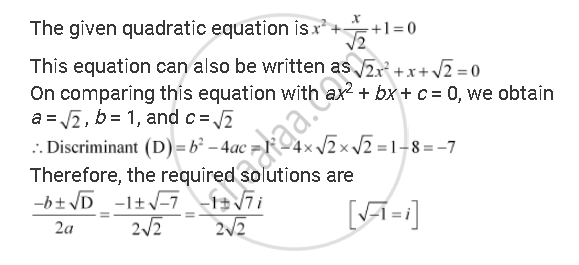Advertisements
Advertisements
Question
Solve the equation `x^2 + x/sqrt2 + 1 = 0`
Solution

APPEARS IN
RELATED QUESTIONS
Solve the equation x2 + 3x + 9 = 0
Solve the equation `sqrt2x^2 + x + sqrt2 = 0`
For any two complex numbers z1 and z2, prove that Re (z1z2) = Re z1 Re z2 – Imz1 Imz2
If z1 = 2 – i, z2 = 1 + i, find `|(z_1 + z_2 + 1)/(z_1 - z_2 + 1)|`
x2 + 2x + 5 = 0
x2 + x + 1 = 0
\[5 x^2 - 6x + 2 = 0\]
\[x^2 + x + 1 = 0\]
\[x^2 + \frac{x}{\sqrt{2}} + 1 = 0\]
Solving the following quadratic equation by factorization method:
\[x^2 + 10ix - 21 = 0\]
Solve the following quadratic equation:
\[x^2 - \left( 2 + i \right) x - \left( 1 - 7i \right) = 0\]
Solve the following quadratic equation:
\[i x^2 - 4 x - 4i = 0\]
Solve the following quadratic equation:
\[2 x^2 + \sqrt{15}ix - i = 0\]
Solve the following quadratic equation:
\[i x^2 - x + 12i = 0\]
Solve the following quadratic equation:
\[x^2 - \left( 3\sqrt{2} - 2i \right) x - \sqrt{2} i = 0\]
Solve the following quadratic equation:
\[2 x^2 - \left( 3 + 7i \right) x + \left( 9i - 3 \right) = 0\]
The complete set of values of k, for which the quadratic equation \[x^2 - kx + k + 2 = 0\] has equal roots, consists of
The values of x satisfying log3 \[( x^2 + 4x + 12) = 2\] are
If α, β are the roots of the equation \[x^2 + px + 1 = 0; \gamma, \delta\] the roots of the equation \[x^2 + qx + 1 = 0, \text { then } (\alpha - \gamma)(\alpha + \delta)(\beta - \gamma)(\beta + \delta) =\]
The number of real solutions of \[\left| 2x - x^2 - 3 \right| = 1\] is
The number of solutions of `x^2 + |x - 1| = 1` is ______.
If the roots of \[x^2 - bx + c = 0\] are two consecutive integers, then b2 − 4 c is
The value of a such that \[x^2 - 11x + a = 0 \text { and } x^2 - 14x + 2a = 0\] may have a common root is
The values of k for which the quadratic equation \[k x^2 + 1 = kx + 3x - 11 x^2\] has real and equal roots are
If the equations \[x^2 + 2x + 3\lambda = 0 \text { and } 2 x^2 + 3x + 5\lambda = 0\] have a non-zero common roots, then λ =
If one root of the equation \[x^2 + px + 12 = 0\] while the equation \[x^2 + px + q = 0\] has equal roots, the value of q is
The value of p and q (p ≠ 0, q ≠ 0) for which p, q are the roots of the equation \[x^2 + px + q = 0\] are
If α, β are the roots of the equation \[x^2 + px + q = 0 \text { then } - \frac{1}{\alpha} + \frac{1}{\beta}\] are the roots of the equation
If the difference of the roots of \[x^2 - px + q = 0\] is unity, then
The least value of k which makes the roots of the equation \[x^2 + 5x + k = 0\] imaginary is
If 1 – i, is a root of the equation x2 + ax + b = 0, where a, b ∈ R, then find the values of a and b.
If `|(z - 2)/(z + 2)| = pi/6`, then the locus of z is ______.
